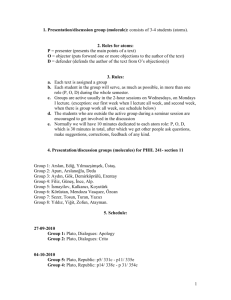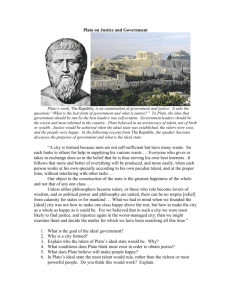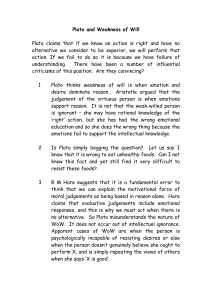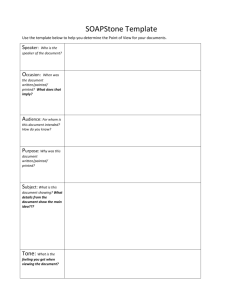Plato's Republic - People at Creighton University
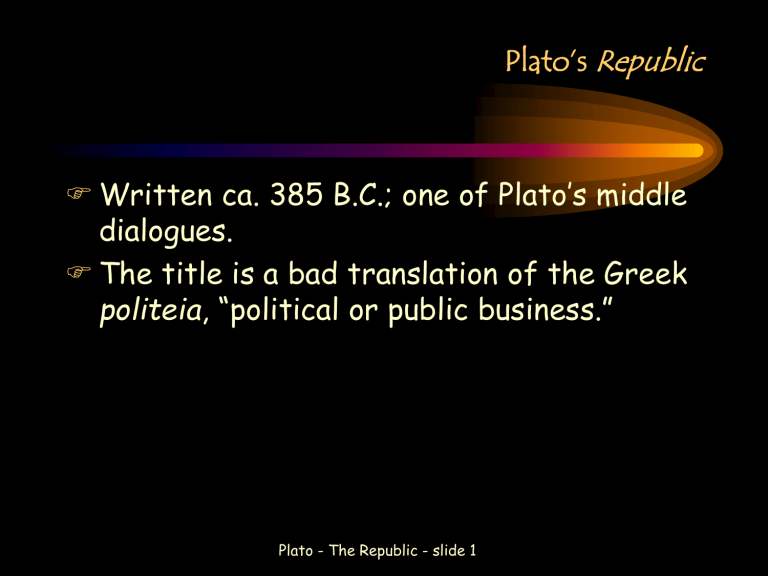
Plato’s Republic
Written ca. 385 B.C.; one of Plato’s middle dialogues.
The title is a bad translation of the Greek
politeia, “political or public business.”
Plato - The Republic - slide 1
Plato’s Republic
1. Plato’s theory of the “origin of a city”
(Griffith trans. 369b)
What kind of theory is this?
• Anthropological?
• Historical?
• Rational?
Plato - The Republic - slide 2
Plato’s Republic
Are two principles which are the basis for the social character of humans
• 1. No person is self-sufficient; all have basic needs (369b).
• 2. Each person is born with a specific aptitude for some type of work (370a-b).
– For Plato, talents or aptitudes are natural.
Plato - The Republic - slide 3
Plato’s Republic
Summary formula of Plato’s theory of the origin of society
• needs + aptitudes + specialization + exchange of goods & services = fulfillment of needs of all & happiness
Plato - The Republic - slide 4
Plato’s Republic
Transition to the next topic: the life of humans should go beyond a “city of pigs” (372d).
• Humans desire luxuries
• Leads to expansion
• Leads to war
• Need for an army
Plato - The Republic - slide 5
Plato’s Republic
2. The class structure of the Republic
(1) The military - “guardians”
• Their education (376c-412b) - brief glance
(2) The rulers
• The best of the guardians, older, wiser, and concerned with the wellbeing of the whole society (412c).
Plato - The Republic - slide 6
Plato’s Republic
(3) Workers (“farmers and [other] skilled workers” 415a)
How is the authority of the rulers to be established?
• The teaching of a myth - the myth of gold, silver, iron & brass (415a)
A class, not a caste system (415b)
Plato - The Republic - slide 7
Plato’s Republic
3. The virtues of the state
(1) Wisdom (428b-429a)
• the virtue of the rulers
• good judgment
• general knowledge vs specialized
(tacitly suggested in the discussion about carpentry & farming, 428b-c)
Plato - The Republic - slide 8
Plato’s Republic
• very few have it (429a)
• ultimately, wisdom is knowledge of the Ideas
(2) Courage (429a)
• the virtue of the military
• knowledge of what is and what is not to be feared (429b, 430b)
Plato - The Republic - slide 9
Plato’s Republic
(3) “Self-discipline” (Griffith trans.
430d); often called moderation or temperance (s phrosun )
• the virtue of the workers
• “mastery of pleasures and desires”
(430e)
• “a kind of order” (430e) - the proper order of the superior & inferior
– on the level of the individual & of the state
Plato - The Republic - slide 10
Plato’s Republic
• Plato’s attitude toward the workers
– Cf. George Orwell’s 1984.
Plato - The Republic - slide 11
Plato’s Republic
(4) Justice (432b-d)
• Each person ought to do that task for society which fits his or her natural aptitudes . . .
• and not trying to do other people’s jobs for them
• Connection with Plato’s theory of the origins of the state (433a, reference is to 369b)
Plato - The Republic - slide 12
Plato’s Republic
• Justice in the individual -- the proper & natural order within the soul of its parts (444b-d)
Plato - The Republic - slide 13
Plato’s Republic
• Cf. Plato’s notion of justice to the modern Western notion
– Plato emphasis is on duty of citizens to the community & state.
Focus is on the common good
– modern emphasis is on fairness in the distribution of rights & legal processes
Focus is on the individual
Plato - The Republic - slide 14
Plato’s Republic
4. The three parts of the soul
• The “rational element” (Griffith trans. 439d)
• The “spirited element” (441a)
• The “desiring element” (439d)
Plato - The Republic - slide 15
Plato’s Republic
For Plato, just as it is important for the well-being of the state that each class does its job, so also it is important for the well-being of the individual that each part of the soul does it job.
• What does this mean?
Plato - The Republic - slide 16
Plato’s Republic
Overview of topics 2, 3, & 4
• A series of parallelisms classes rulers military workers virtues wisdom courage parts of the soul rational spirited self-discipline desiring
Plato - The Republic - slide 17
Plato’s Republic
5. The status of women in the Republic
Women in ancient Athenian Greece
• Their place was in the household
– Only roles outside of the household - priestesses, mourners at funerals, participants in religious festivals
• Strict division of occupations by sex
Plato - The Republic - slide 18
Plato’s Republic
• Uneducated; most were illiterate
• Dowries
Plato
• Occupations should not be based on sex (451d, e, 452a-b, 454d-e, 455de)
• Hint that woman can be rulers
(455d-e, 456a)
Plato - The Republic - slide 19
Plato’s Republic
• Woman guardians receive the same education as men (456b-c)
• In the Laws - abolishment of dowries
• But there are occasional misogynistic passages in the Republic
(431b-c, 557c, 563b)
To the essay by Julia Annas on
The Republic & feminism
Plato - The Republic - slide 20

